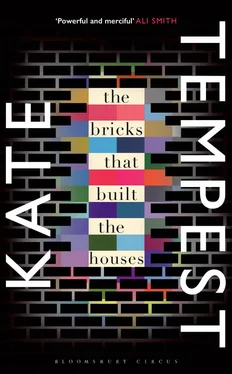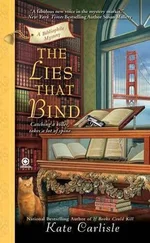Pete turns and sees her as she walks towards him. Lean and agile, like a serpent, full of movement. She is wearing a baggy shirt and scruffy jeans, swinging her hips, and beneath her clothes he can sense the outline of her body. In that moment, she is the most beautiful woman he has ever seen. Her hair is up and longer bits fall over her face, deep dark black brown. He attempts to smile but his features are water leaving a sink. She stops beside him. He kisses her cheek.
‘Drink?’
‘Yeah. I’ll get it though,’ she says.
She commands a seriousness that Pete isn’t used to. There is an intensity in the way she inhabits her body and space that cuts Pete right through the middle but they talk easily, drifting from one thing to another, without hurry or awkwardness. They drink beer then wine then whisky then gin.
They are nearly drunk when, at last, she decides it’s time to find the words.
The room smudges and darkens. There are no edges to shapes. There are no edges to sounds. Everything is mulch and vacuum. Becky swims towards the point of speech. Her mouth is the funnel of a gramophone, her chest a spinning vinyl. The words are slow; they come out steeped in mud.
‘The book you were reading, when you came in the caff yesterday?’ She is swimming upwards from the sea bed, about to break the surface and return to life.
‘Yeah?’ Pete is not aware of Becky’s agony.
‘What was it?’ she says, time returns and she is disorientated. A snap in her ears and her neck and things move as they should. The edges of objects paint themselves back on.
Pete thinks hard, everything exaggerated in the fug of drink.
‘It was maybe, a book by John Darke, I think his name is. A politics book. Why?’
‘Have you read it before?’ she asks carefully. Her breath is a broken wing.
‘No, I just got it. I’ve been trying to get hold of it actually for ages. Have you heard of John Darke?’ They are sitting across from each other at a small table near the wall. He is leaning forwards onto his elbows; she is leaning back into her chair, her feet up on the chair opposite.
‘Where did you get it?’
‘Online.’
‘What, did you just search for it?’ Her voice is trembling slightly.
‘No, it’s. I subscribe to this website thing, it’s, like, banned books, censored authors, you know. Shit like that. I get, erm, updates when things are found in print and stuff.’ He watches her. She sits and thinks for a while, staring into the middle distance. He waits, drinks his gin. ‘Why do you ask?’
She takes her feet off the chair and swivels so she’s facing him, then studies him. He doesn’t smile into her look, just sits there; her eyes cook him till he’s tender. Her heart is slicked with oil. She is a Francis Bacon painting, yelling silently and staring out. His face is innocent. He has a nose, two ears, two lips just like a human, but he’s bearing something mythical, carrying her dad towards her.
‘John Darke?’
‘Yeah?’
‘Who’s he then?’
Pete purses his lips, frowns. ‘Well.’ His tone is cheerful, he’s feeling warm inside. ‘He’s a legend. Quite the man.’
‘Why? What did he do?’
‘Ah, well, now you’re asking! He was a politician? I think, yep, and a writer. Teacher, too. He was, erm, a brilliant mind. Definitely. I mean, the book, it’s amazing so far, he had this idea, about how to make democracy accountable, how to reinstall democracy in the West, take power back from corporations and empower people again, but. what happened to him? Something awful. Stitch-up. Framed for something. Murder? Something horrible. Rape? Reputation in tatters, whole nine yards. Locked him up for a long time, but his legacy lives on. His ideas, I mean. Think he’s still inside somewhere.’
Her heart is pounding. She is sitting very still, mouth open slightly, clutching her glass.
Pete spreads his arms. ‘Quite a guy.’ He shakes his head. ‘But I’m into all that, you see. You can look him up. Wikipedia or whatever.’ She holds his eyes for longer than he can bear. He can’t read the look. She gets up suddenly.
‘I’m just gonna pop to the bathroom, Pete,’ she says, her legs shaking in her jeans. She walks carefully to the Ladies, stands in front of the mirror and stares for a full minute at the features on her face.
They’re out on the street, clouded with drink, smoking. Talking in friendly voices about the schools that they went to, the jobs that they’ve had. They are walking to the bus stop, Becky has taken Pete’s arm and is holding on to his sleeve, feeling the side of his body against hers.
As the bus rolls over the bridge, back south, they both feel the same tug, the wash and blast of home.
She wants to take him to bed. He’s booze-confident and he swings his arm round her shoulder and she walks close to him up the howling main road. They bundle up the stairwell, out into the fourth-floor corridor and lean over the railings of the balcony, looking out at the streets, London’s bleeding gums. He follows her into her flat and stands beside her in the tiny kitchen as she opens the whisky and looks for something clean to pour it into. She leans across him for the glasses and he feels the charge of proximity, reaches out for her, and she responds. Slowly stopping, turning herself to stand a centimetre from his face, moving her nose across his skin. He is paralysed, watching her. They start to kiss, they pull each other down and undress heavily, banging their knees on the hard tiles and their heads on the kitchen units. Laughing, slipping apart, reaching out again.
In the morning she kisses him goodbye on the main road. A world-shrinking gut-smashing kiss on the mouth. She walks away, her body like machinery; he notices the perfect symmetry of every pump and thrust, skewered by the economy of her movement. She doesn’t look back once. He watches her smash through the street until she’s out of sight. And even then, he watches the last space she occupied until his eyeballs feel sore.
She is already thinking of other things. She’s on her way to her uncle’s caff. She wonders whether her uncles were kind to her mother when they were children. Whether her mother remembers the days before they moved into Uncle Ron’s, when they slept in a phone box.
She thinks of a group of dancers that she studied with who have a show on in town. On the flyer they are all in black under beams of serious light. She’d laughed at the picture when she saw it online, but it comes to her now and it pains her. The thought of them meeting, rehearsing together. She had always found their ideas simplistic and their routines unsurprising. In class, they were loud, domineering characters who lacked originality. It was easier to laugh at them than acknowledge the fact that, for all the years she’d known them, she’d felt superior, but now they are doing it and she is not.
She thinks of Kemi Racine. Her dark monobrow set low like Frida Kahlo’s, wanting to dance, talking about people who come to auditions wanting to be dancers more than wanting to dance. Racine is Becky’s favourite living choreographer. She never gets the big commissions. She’s only really known by those who seek her out. She is not famous or particularly highly regarded. Her work is often poached and passed off as the work of her more successful male peers. She teaches at an unimportant school in Copenhagen. Becky had read her newspaper article the week before. It was a call for women to stick to choreography and not be scared off by the lack of opportunity, funding or support. Build your own networks, she had said. Fuel your own engine.
Becky watches the people, the street, hears the noise and feels the pavement and dares to think of what she might like to say about it all one day, with her body, in a piece of her own.
Читать дальше












